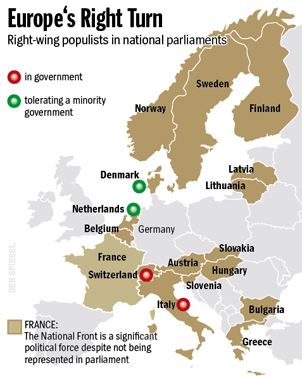European Right Uniting, American Conservatives More Fragmented
 Not content to be marginalized in “establishment” parties, the European Right is on the move–and winning elections and places in government. As reported earlier this month, “In the recent FoxNews report Britain’s version of Tea Party rocks political system across the pond Adam Shaw points out that ‘In this year’s local elections – the British version of midterms — UKIP took a stunning 23 percent of the vote, up from the 3.1 percent they won in the 2010 national election.’”
Not content to be marginalized in “establishment” parties, the European Right is on the move–and winning elections and places in government. As reported earlier this month, “In the recent FoxNews report Britain’s version of Tea Party rocks political system across the pond Adam Shaw points out that ‘In this year’s local elections – the British version of midterms — UKIP took a stunning 23 percent of the vote, up from the 3.1 percent they won in the 2010 national election.’”
Political parties across Europe have also had to make up for the disadvantage of having no voice in national media by taking to the streets in attention-grabbing agitation. No pain, no gain. Polite, small, orderly steps aren’t effective, they say. European leaders like Geert Wilders and Marine Le Pen and Nigel Farage realize that their countries’ heritage is being destroyed too rapidly.
Nor are those who make it into government content to hang back, blend in, and mind their careers. Agitation means everything when so much is at stake. Immigration must be turned back, while political correctness must be challenged daily by whatever it takes.
The other great cause for the European Right is to turn back the one-world, money-obsessed takeover of separate countries by the establishment European Union, seen as soulless and socialistic. The older concept of “city states” almost seems preferable compared to a United Nations of Europe, one which is already being sucked up into an even more global power scheme.
While the term Right is a rallying cry in Europe, sympathizers in the US have avoided the designation. Why? Because the American press only allows the phrase “Far Right” or “Hard Right” to be used, and is never mentioned unless vilified by association with extremist, fringe groups.
All that remains in America is to call oneself a conservative, a term that means almost nothing and now includes just about every political candidate. It’s a word that vaguely conjures up a range of feel good sentiments. Food welfare and do-goodism of every stripe is justified under the banner of being a fiscal conservative.
Jimmy Carter, Bill Clinton, George W. Bush, John McCain, and Mitt Romney all wanted the extra votes that being a conservative promised. After all, money makes or breaks a campaign, not principles, and every election was seen as a squeaker. That was the past. Today the 47% of apolitical “welfare” voters have grown to accommodate automated results.
Shouldn’t the US take some cues from likeminded political activists in Europe before it’s too late?
 Not content to be marginalized in “establishment” parties, the European Right is on the move–and winning elections and places in government. As reported earlier this month, “In the recent FoxNews report Britain’s version of Tea Party rocks political system across the pond Adam Shaw points out that ‘In this year’s local elections – the British version of midterms — UKIP took a stunning 23 percent of the vote, up from the 3.1 percent they won in the 2010 national election.’”
Not content to be marginalized in “establishment” parties, the European Right is on the move–and winning elections and places in government. As reported earlier this month, “In the recent FoxNews report Britain’s version of Tea Party rocks political system across the pond Adam Shaw points out that ‘In this year’s local elections – the British version of midterms — UKIP took a stunning 23 percent of the vote, up from the 3.1 percent they won in the 2010 national election.’”